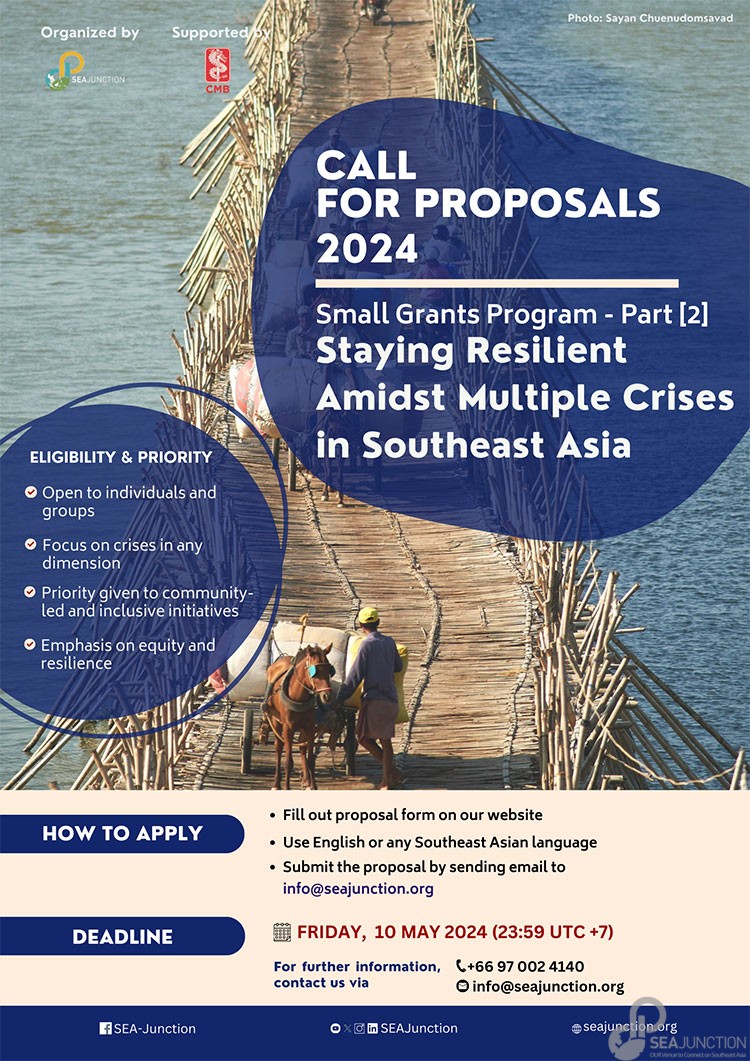Call for proposals: Small Grants Program (Part 2) “Staying Resilient Amidst Multiple Crises in Southeast Asia”
This is a second call for proposals of the small grants program, “Staying Resilient Amidst Multiple Crises in Southeast Asia”, initiated in 2020 by SEA Junction with support from CMB Foundation. Please visit here to see our grantees from last year.
In Southeast Asia as in other regions, the pandemic has exposed deep social and health inequities across countries and people and shown the multi-dimensional and interlinked aspects of marginalization. The precarious architecture of unbalanced systems – unconcerned with sustainable development, resilience, and equity – is tumbling down in a cascade of “synchronous failures” that disproportionately affect those on the margins of our societies. Among the many simultaneous critical issues about and beyond the pandemic are conflict situations foremost the military coup and its violent aftermath in Myanmar, environmental disasters, displacement and forced mobility, cyber scamming industry and human trafficking, gender exploitation and economic deprivation.
Communities in Southeast Asia are confronted with complex crises in health, political, socioeconomic and environmental dimensions. In the past 3 years, the COVID-19 pandemic has laid bare the implications of health and socio-economic inequity on people well-being and safety, shown the inability of most systems to socially, economically and medically protect the most vulnerable in our societies and exposed the entrenched wealth and welfare inequities in the ways people have been differentially affected by the pandemic. It has also shown the urgent need for communities to enhance their preparedness in facing multiple overlapping crises.
The economic outlook for the region remains worrisome due to its dependence on foreign trade and tourism. With key sectors impacted, supply chains disrupted and faltering domestic consumption, employment and livelihoods, especially for those in the informal sector –most often women and discriminated groups— have been jeopardized and gaps among haves and have-nots have widened.
Simultaneously, political turmoil and instability have continued to impede development. Most countries in the region are vulnerable to democratic threats and domestic unrest along ethnic, religion, gender and other identity boundaries is rife. In addition, the climate-induced disasters and environmental degradation coupled with unplanned development and climate change put communities across the region at risk. It has an impact on health and safety but also on socioeconomics because many people rely on the environment to sustain economic growth and livelihoods.
Communities are, however, not passive victims of external forces. Even in times of crises, they remain resilient and mobilize their scarce resources and available preparedness mechanisms to address and overcome adversities. In their struggle, they are supported by concerned civil society and grass-roots organizations through short-term community development and humanitarian assistance efforts as well as longer-term advocacy strategies to promote a transformative agenda and structural reforms.
To strengthen resilience of marginal communities in Southeast Asia, SEA Junction will continue for three more years the small-grant program launched in 2020 with support from CMB Foundation and other individual and institutional donors. Initially with a focus on resilience amid the COVID-19 pandemic, the program is now expanded to cover multiple complex crises. Small grants for an average of USD 2,500 are to be awarded to efforts by groups and individuals to foster resilience amidst any or a combination of the interlocked crises such as health, political, socioeconomic and/or environmental crises. Preventive and preparedness initiatives will also be considered. Last year, we supported 26 projects from 7 Southeast Asia countries – Cambodia, Laos, Indonesia, Myanmar, Malaysia, Philippines, Indonesia – and Bangladesh covering various themes including climate change, human rights violations, migration, nutrition, reproductive health, and education. This year, we welcome proposals that highlight crisis from different perspectives, encompassing human rights, climate change, education, health care, mobility, trafficking, development, economy, and democracy, among others.

Details on eligibility criteria, guidelines for submission, and deadlines are listed below.
Eligibility and Priority:
- Focus is on crisis in any dimensions
- Open to individuals and groups (both formal and informal)
- Proposed activities are located in Southeast Asia
- Priority is given to marginal groups and community-led and inclusive initiatives
- Emphasis on equity and resilience
How to Apply:
- Download and fill the proposal form provided here: Proposal Template
- Use English or any Southeast Asian languages
- Submit your brief proposal by email to info@seajunction.org
- Application Deadline: Friday, 10 May 2024 (23:59 UTC +7)
Funds can be used to complement existing institutional resources as well as seeds or matching funds. Besides providing financing, the program also shares relevant resources, fosters cross-fertilization of ideas and interventions, helps build networks and conducts joint advocacy activities.
Managed by:
SEA Junction, established under the Thai non-profit organization Foundation for Southeast Asia Studies (ForSEAs), aims to foster understanding and appreciation of Southeast Asia in all its socio-cultural dimensions- from arts and lifestyles to economy and development. Conveniently located at Room 408 of the Bangkok Arts and Culture Center or BACC (across MBK, BTS National Stadium), SEA Junction facilitates public access to knowledge resources and exchanges among students, practitioners and Southeast Asia lovers. For more information see www.seajunction.org, join the Facebook group: http://www.facebook.com/groups/1693058870976440/ and follow us on twitter and Instagram @seajunction.
With support of:
China Medical Board (CMB) Foundation, an independent American foundation started in 1914, aims to advance health in China and neighbouring Asian countries through strengthening medical, nursing and public health research and education. See further chinamedicalboard.org.


